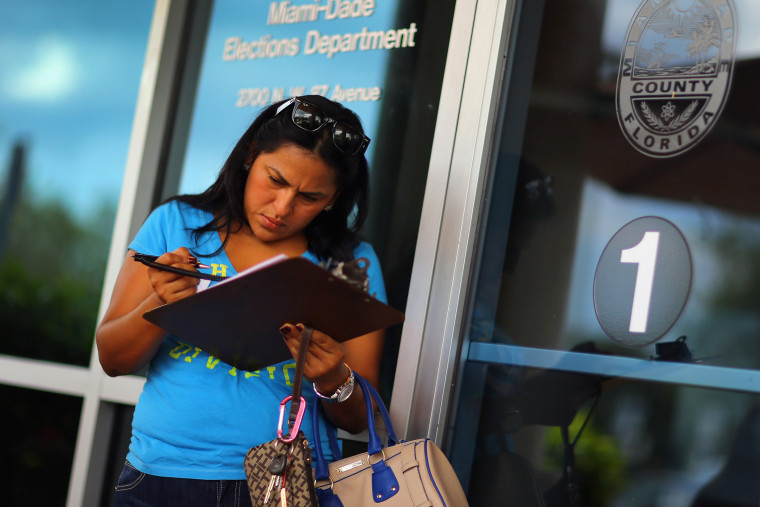Democrats are rolling out a new program that uses sophisticated data analysis to identify the neighborhoods that are ripest for registering new voters—potentially making the party’s registration drives far more effective. The effort underlines Democrats' growing focus on bringing new voters into the process, with the party’s chances for electoral success increasingly hinging on boosting turnout.
Thursday morning, the Democratic National Committee (DNC) announced the Arbor Project, named for its focus on the grassroots. DNC officials plan to showcase the project Saturday in meetings with national and state party leaders.
“The goal of the Arbor Project is simple – to empower campaigns, grassroots partners and state parties to run registration programs based on the most accurate and up-to-date data available, and arm new and current voters with the information they need to cast their ballot,” said Rep. Debbie Wasserman Schultz, who chairs the DNC.
Here's what that means: Through the project, campaigns and state parties will have access to data showing them not just the number of currently unregistered potential Democrats in a given precinct, but also the expected vote gain that a registration drive in that precinct would provide. They could also look at a “density index” that rates the neighborhood’s suitability for door-to-canvassing operations, so as to avoid wasting resources by sending volunteers into difficult-to-canvass areas where houses are far apart.
The aim is to offer a simple cost-benefit analysis for evaluating potential voter registration drives in any area. And it ensures that all the Democratic campaigns—from the presidential campaign down to state legislative races—are using the same technology, so their efforts can more easily benefit each other.
The project also includes a website, IWillVote.com, that provides a one-stop-shopping guide to educate people on the process for registering and voting, offering voter registration forms in English and Spanish.
The Arbor Project melds voter files that the party has built up over a decade with detailed information gathered by the Obama campaigns, publicly available sources like the Census, and even consumer data.
Data wizardry aside, the project marks the latest stage in Democrats' increasing interest in bringing previously inactive voters into the process. It was developed in part by the DNC’s Voter Expansion Project, launched earlier this year, which aims to expand access to voting, and to push back against Republican-backed voting restrictions like voter ID.
DNC officials see the Arbor Project as a long-term effort to build the party, rather than a narrowly focused tactic for 2014. They cite Texas, with its massive and growing population of unregistered Hispanics, as a state where it could be particularly valuable.
There’s a good reason for the Democrats’ interest in expanding the electorate. As partisan divisions solidify, the party’s electoral chances increasingly depend on turning out its core supporters—racial minorities, young voters and unmarried women, among others. That’s much of the reason for the big drop in the party’s recent performances in midterm cycles compared to presidential years.
It’s a reality the GOP understands just as well—hence the party’s efforts to make voting harder. As DNC spokesman Mo Elleithee put it while speaking to reporters in March, Republicans “know that when the electorate is large, they lose, when the electorate is smaller, they win.”
And increasingly, these battles are focused on the voter registration process as much as on voting itself. Already, Battleground Texas, a group of Obama campaign veterans, is working to register and mobilize new voters in that state. Meanwhile, Republicans are working to restrict voter registration not just in the Lone Star State, but also in Wisconsin, Arizona, Kansas, and more.
